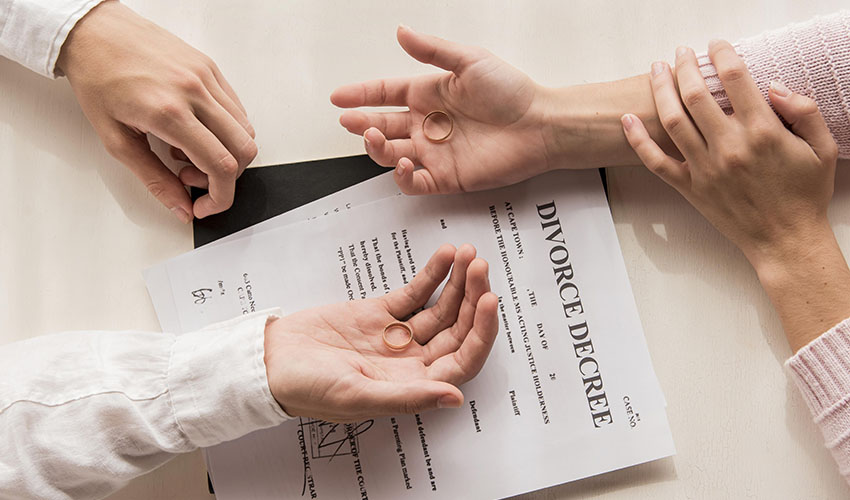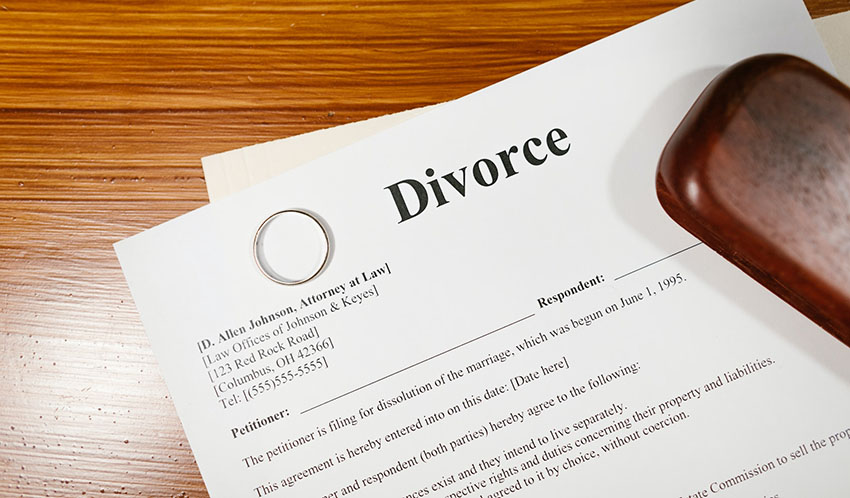In a divorce, the division of marital assets can become a highly contentious issue, especially if you and your former spouse are disputing the importance of your inheritance and divorce.
Inheritance and divorce do not always work particularly well together and can cause much conflict.
The best way to ensure things run smoothly is to hire a family lawyer, who specializes in divorce.
There are many aspects to consider, and the result of every situation is determined on a case-by-case basis.
You may have received an inheritance from one or both of your parents or another family member, and you feel therefore that in the property settlement, the entirety of the inheritance should be returned to you.
Your ex-spouse may view this differently, thinking instead that the inheritance is an asset that benefited your whole family or both of you as a couple.
They may feel that excluding the inheritance from the divisible pool of assets will not give them their fair entitlements in the property settlement.
A key difficulty of property settlements and inheritance is that there is no clear-cut way to decide how the asset pool is managed and who gets what.
It is almost impossible to predict the resolution of your unique situation, but some relevant points will give you an idea.
Relevant considerations on the laws on inheritance and divorce
If you or your spouse receives an inheritance, it can be divided during divorce proceedings.
Please note that the keyword in the above sentence is “can“.
Things to consider when asking whether or not an inheritance can be taken in divorce settlement proceedings:
- When was the inheritance received?
- Who received the inheritance?
- How long was the duration of the relationship?
- What were the contributions made by each person during the relationship?
- What is the value of the inheritance, and how does it relate to the overall asset pool?
The answers to the above questions will be important when determining whether or not the inheritance should stay with the person it was left to, or should be split to that person’s spouse upon divorce.
For example:
Jack receives an inheritance of $100,000 from his grandmother when he is 21.
He then meets Jill when he is 22 years old.
Jack uses the money from his inheritance when he is 24 years old to buy a house in Sydney worth $800,000.
Jack gets married to Jill when he is 25 years old. They then move into the house that Jack bought.
They have two children, one when Jack is 28 years old and another when Jack is 31 years old.
Jack and Jill separate when Jack is 45 years old.
Financial proceedings commenced when Jack was 46 years old.
The house that he originally purchased for $800,00 has now increased to $1,600,000.
Does the inheritance get included in a divorce?
In such a situation, the inheritance will probably be included in this scenario.
Reasons that contribute to this:
- The duration of the relationship was long (20 years).
- Both Jack and Jill lived and therefore contributed to the upkeep of the property that was purchased with the inheritance.
- The sum of the inheritance was minor compared to the accumulated equity that now exists.
Now in that same example, if Jack received the inheritance when he was 44 years old, or if the size of the inheritance was $2,000,000 instead of $100,000, or if he separated from Jill when he was 27 years old – then there will be a different outcome.
We’ve provided this example of how inheritance and divorce work so you can understand that there is not a one-size-fits-all approach to how it works.
We will now go in-depth into the questions that a court will ask when determining if inheritance gets included in a divorce.
Who Received The Inheritance?
This is an important question in property settlements and inheritance.
In the vast majority of cases, only one party in a couple is the recipient of the inheritance.
The testator may bequeath the inheritance specified in their will that it was to be given to both spouses as a couple.
Therefore, in a case such as this, the inheritance is a shared asset and a contribution that both parties have made to the relationship.
It will be included in the divisible pool of assets, but only if the wishes of the testator are very clear.
When Was The Inheritance Received?
Inheritances are treated differently in property settlements depending on when they were received in the course of the marriage or de facto relationship.
Inheritances received either very early in the relationship, before the relationship began or before the couple began living together are more likely to be treated as an initial contribution to the marriage on the part of the beneficiary of the inheritance.
Particularly for long relationships, an inheritance contributed at the very beginning can have little to no impact on the beneficiary party’s entitlements in the property settlement.
Other contributions the party has made may decrease the impact of the inheritance.
According to our property settlements lawyers, with inheritance, the earlier the inheritance was received, the more likely it is to be included in the pool of assets to be shared between the two parties in the event of divorce.
If the inheritance was received during the relationship, it was likely used for the benefit of both spouses, for example for holidays, buying or renovating a home or other bills and household expenses.
Therefore, in this case, the inheritance would generally be treated as a monetary contribution to the couple’s shared assets.
If it is clear that the inheritance was not used for the benefit of the couple together, the court may take a different approach.
Some people may become beneficiaries of inheritance quite late in their relationship with their spouse, or even after separation and before the divorce proceedings.
Here, it is harder to say how the court will treat the inheritance.
However, because the opportunity to use the inheritance as a contribution to the relationship is diminished, the court is more likely to exclude the inheritance from the pool of assets divided between both parties.
As always, with property settlements and inheritance, the use of the inheritance – for example for the mutual benefit of the beneficiary and their spouse – affects the way it will be considered as a contribution and an asset.
Value Of The Inheritance
The problem of including or dividing an inheritance in a divorce can change depending on the inheritance’s value.
For some couples working out a property settlement, the inheritance one of them received is a very significant asset compared to the rest of the assets compiled in the divisible pool to be shared according to their entitlements.
This means that if the beneficiary were to retain the inheritance entirely for themselves, their ex-spouse would not receive a just and equitable result from the division of property as their contributions and entitlements would be not sufficiently recognized.
Therefore, when the divisible asset pool is substantially smaller than the inheritance, the latter may well be included to ensure a fair outcome for both people.
Relationship With The Testator
Determining the inclusion or exclusion of the inheritance in the property pool may be complicated by exceptional circumstances, such as the relationship between the parties and the testator.
Though the testator may leave an inheritance to one spouse in the relationship, the other spouse may also have had an important relationship with them.
The testator may have lived with or been cared for by both parties, especially if they were a parent.
Notwithstanding the intentions of the testator as recorded in their will, this may have an effect on the court’s consideration of the inheritance in the divorce proceedings
How to finalise divorce and inheritance issues
The easiest and by far the most stress-free way is for two former spouses to make a concerted effort to come to an agreement themselves about the property settlements and inheritance.
This will most likely involve negotiation and compromise in a family dispute resolution process, and, if the parties can agree, this is a better way to divide the assets.
If you can come to an amicable agreement, the parties can apply to the family court for consent orders to make this agreement official.
After trying to negotiate, if the parties are unable to come to a consensus about the division of assets, the case will go to the family court.
It is then up to the court what will happen to the inheritance.
The court will then decide what will and will not be included in the divisible pool of assets, each spouse’s entitlements in the property settlement, and whether any adjustments need to be made in one party’s favor.
Our lawyers are able to assist with this process, and we are also able to assist with the transfer of property, as we have conveyancers in NSW and conveyancers in QLD.
Case Studies
Granger & Granger (2018)
In the case of Granger & Granger, Mr and Ms Granger were in court to divide the property of their 40-year marriage.
Each party had inherited money from one of their parents: Mr Granger inherited $176,750 in 2005 and Ms Granger inherited $700,000 in 2011.
Ms Granger’s substantial inheritance came just 18 months before the marriage ended in early 2013.
Ms Granger wanted her inheritance excluded from the divisible marital assets, however, the court found that this would not provide adequate recognition of Mr Granger’s contributions to the marriage.
He had lost the majority of his inheritance in a failed investment, and his inheritance was treated as part of the divisible asset pool.
Ms Granger’s inheritance was also a significant proportion of the $1.5 million asset pool.
In the interest of not undervaluing the husband’s contributions, the court chose to include Ms Granger’s inheritance in the pool of assets shared between the parties.
The court determined their entitlements as 60 per cent to Ms Granger and 40 per cent to Mr Granger.
Figgins & Figgins (2002)
In this unique case of inheritance and divorce from 2002, the wife appealed against property orders from the previous year that had awarded her $1,100,000 but refused her spousal maintenance.
The couple were in a relationship from 1987.
They married in 1994, separated in 1997 and divorced in December 2000. They had one child together, at the time aged six.
Prior to and at the very beginning of their marriage, they earned relatively similar, modest incomes and made equal contributions to the relationship.
Just over two weeks after their wedding, the husband’s father and step-mother died in a helicopter accident.
The husband and his sister inherited estates worth $28,000,000.
At the time of divorce, this inheritance represented almost all of the couple’s marital assets.
In the appeal, it was found that the trial judge was mistaken in her treatment of the inheritance and that the wife’s contributions were undervalued.
The appellate judge stressed that if it were not for the considerable inheritance, the husband and wife would have made relatively equal contributions.
The wife was the primary carer of the couple’s child, both during and after the marriage.
The judge allowed the appeal in part, ordering the husband to pay the wife $2,300,000, however, the wife was again refused spousal maintenance.
Can My Ex Claim My Inheritance
If you receive an inheritance throughout your relationship, that inheritance may be included in you and your ex’s asset pool.
If one of the parties receives an inheritance during the course of the relationship, then the inheritance will be considered as property in a property settlement under the Family Law Act (1975).
An inheritance can be classified as the following:
- An asset that can be divided between the parties;
- A financial resource that a party can rely on.
If the inheritance is considered to be an asset that is to be divided between the parties, then it may be split or divided according to the property settlement.
Can my ex claim my inheritance if it is considered a financial resource?
If, however, the inheritance is considered a financial resource, then it will not be included in the asset pool.
Instead, the Court will consider the fact that one party will be able to access the inheritance to the exclusion of the other.
The court may then (at its discretion) make an adjustment in favor of the party who did not receive the inheritance.
Inheritance and Divorce
Secure your future during a divorce with Justice Family Lawyers. Our expertise in inheritance and divorce ensures your assets are protected. Take the first step towards safeguarding your inheritance.
Contact us now for specialized guidance and representation that puts your interests first. Let’s navigate your legal journey together.
Principal of Justice Family Lawyers, Hayder specialises in complex parenting and property family law matters. He is based in Sydney and holds a Bachelor of Law and Bachelor of Communications from UTS.









25 thoughts on “Inheritance and Divorce”
My sibling and I inherited a rental property from a deceased estate 3 years ago if I survive my brother will his wife be entitled to his portion of the inherited property if she was not included in the Will ? How can we avoid this from happening
Hi Marnie, essentially yes his wife will be entitled a portion of the property because this property forms part of the pool of assets. This can be avoided if he signs a BFA with her. Read our articles about binding financial agreements to understand more.
Further information, we have a mortgage on a home, everything else separate. No joint accounts, we each buy our own food, cook own meals, pay own car regos etc. I work full time he doesn’t do even though Bill’s are divided he pay some I pay some, I’m often left paying more than 50% when he has no money. He expects half of my inheritance. Probate application will be lodged soon.
Defacto relationship 22 years last 8 living separately under same roof. I am a beneficiary from late parent expect to inherit $500k.We have a 16yo child who I support financially, emotionally and physically.We have a mortgage on the house everything else separate. No joint accounts, we each buy our own food, cook own meals, pay own car regos etc.I work full time he doesn’t. Paying utility Bill’s divided responsibility. He wants half of my inheritance. Probate just applied for.
Hi, the difficulty you may have is establishing when the actual separation date was, especially if you are living under the same roof. If it is clear that the separation date was 8 years ago, and there is no intermingling of finances, then it is arguable that you shouldnt need to split the inheritance that was received years after the separation.
My wife and I separated 4 years ago.
We are only just now starting divorce proceedings. We have a house together and 2 children under the age of 16. Both my parents passed away this year and I only have just received the inheritance.
My question is this, Is my ex entitled to any of my inheritance in our divorce ?
keeping in mind that my parents passed 4 years after our separation and where healthy prior.
Hi, because you have not finalised your property settlement, the inheritance could be deemed to be part of the pool. You should speak to someone from our office about this as it is one of those ‘gray areas’ that depend on other factors.
I have separated from my spouse,
And we are currently going through property and asset settlement.
My spouses father recently passed away, should the inheritance go into the asset pool?
Thank you
Hi, generally the inheritance will be considered part of the asset pool. However, for detailed advice please get in touch with our firm directly.
Hi can the ex spouse in the divorcé settlement ask for a percentage of a future inheritance – his parents are elderly but still alive and have a will and inheritance available on their passing? TIA
Nick
In divorce settlements, the division of assets typically involves the assets owned by the parties at the time of the divorce. Future inheritances are generally not considered marital property and are often excluded from the assets subject to division. However, it is best to consult with an experienced family lawyer to provide advice tailored to your circumstances.
Separated April this year. Have sold a house which has around 350k equity. I received inheritance from a parent within the first year of marriage in 2011, approximately half was used for various things in the relationship then remaining 30k was invested to buy the house in 2017. Am I entitled to keep the 30k invested or would it be considered shared assets? Thanks
Hi, the 30k you received from inheritance and initially invested would be regarded as one of your assets at the time of separation, and it forms part of the overall property pool. Whether you can retain these funds invested hinges on the specifics of the final property division and any agreements reached with your ex-partner. It is advisable to seek legal advice to get a better understanding of your entitlements and likely outcomes for the property division.
Hi, My mum has just been diagnosed with terminal cancer, she has no will but has started the process. Im currently going through a messy divorce. over 2 years out and settlement still on going – final trial March next year. We will be divorced on the 6 of December 2023 – 12 Months – or if you go from the one month one day rule 7 Jan 2024. Can my ex get part of my inheritance ? is there something we can do to stop this ? My mum is very elderly and the lawyer we approached would not allow her to have anyone else with her to support her through saying what she wanted ? she is aged 94.
I’m sorry to hear about your difficult situation. In Australia, the timing of your divorce and your mother’s health could impact the division of assets. If the divorce is finalised before her passing, her inheritance may be considered post-separation property. However, it is important to consult with a lawyer for guidance.
Just before separating, the spouse receives an inheritance from his deceased father for $1.5M, but it doesn’t get to him (due to needing got sell a property) until after or during the divorce proceedings. Is the wife entitled to any of this? Spouse thinks it is a terrible thing for the wife to even attempt. It has been a 20 year long relationship.
Hi, whether or not part of the inheritance can be claimed by the wife can vary depending on the specific circumstances surrounding the matter. It is strongly recommended that the husband consult with an experienced family lawyer to receive detailed advice tailored to his situation.
Hi Hayder,
Separated from my fiancée 6 months ago. I have been in a legal battle over an inheritance from my uncle and his sons, as it was left to me.
I have not finalised or received the inheritance yet. Does he have a claim?
Regards,
Peta
It depends if it was a long relationship with your fiancee. The claim needs to be disclosed at the very least.
Hi , Just wondering if I’m in titled to my ex superannuation after 23 years ? As I thought it was now law as an asset ? I’m I in titled to his mother inherited after 23 year & did work to the property ,been separated for over 3 years. Also can claim for spouse maintenance, as he has been working
not declaring ,renting out houses. I have to pay rent for my shop & running at a loss. I’m at my rental house & not get an income from there cheers
In Australia, superannuation is generally considered a property asset to be split during a divorce, as outlined in the Family Law Act 1975. After a divorce, you are entitled to make a claim for your ex’s superannuation for up to a year. The division of these assets depends on several factors, including each party’s financial status, responsibilities, and contributions during the relationship
Regarding inheritance, it is included in the asset pool if it was received during the relationship and used for the benefit of both spouses, such as for holidays, buying or renovating a home. However, if the inheritance is received late in the relationship or after separation, the court may treat it differently
Hi, a family member’s wife inherited super and partial ownership of a property last year. Out of the blue, his wife of 12 years has decided she would like to separate. The inheritance would more than doubled their previous net worth. If they divorce, would the inheritance be considered a shared asset and would he be entitled to half of the total net worth?
Hi, the inheritance received by the wife may be considered part of the total asset pool in the event of a divorce. However, the percentage split of the assets, including the inheritance, would depend on multiple factors such as financial and non-financial contributions during the marriage, the duration of the relationship, and future needs of each party. To understand the specific implications and entitlements, it’s essential for the husband to seek guidance from an experienced family lawyer. They can provide tailored advice based on the circumstances of the case.
I received 2 house in my county as inheritances but my parents still alive . The heritage just to be propose for my brother and me not to have trouble if when they pass away. My husband don’t have anything to do with it. But now we thinkiking about divorce and he want that to be included in assets pool. What can I do?
Inheritances received during a marriage can be a complex area in divorce proceedings, and the treatment of these assets can vary significantly depending on your individual circumstances. It is important to consult with an experienced family lawyer to better understand your rights and options in your specific situation.